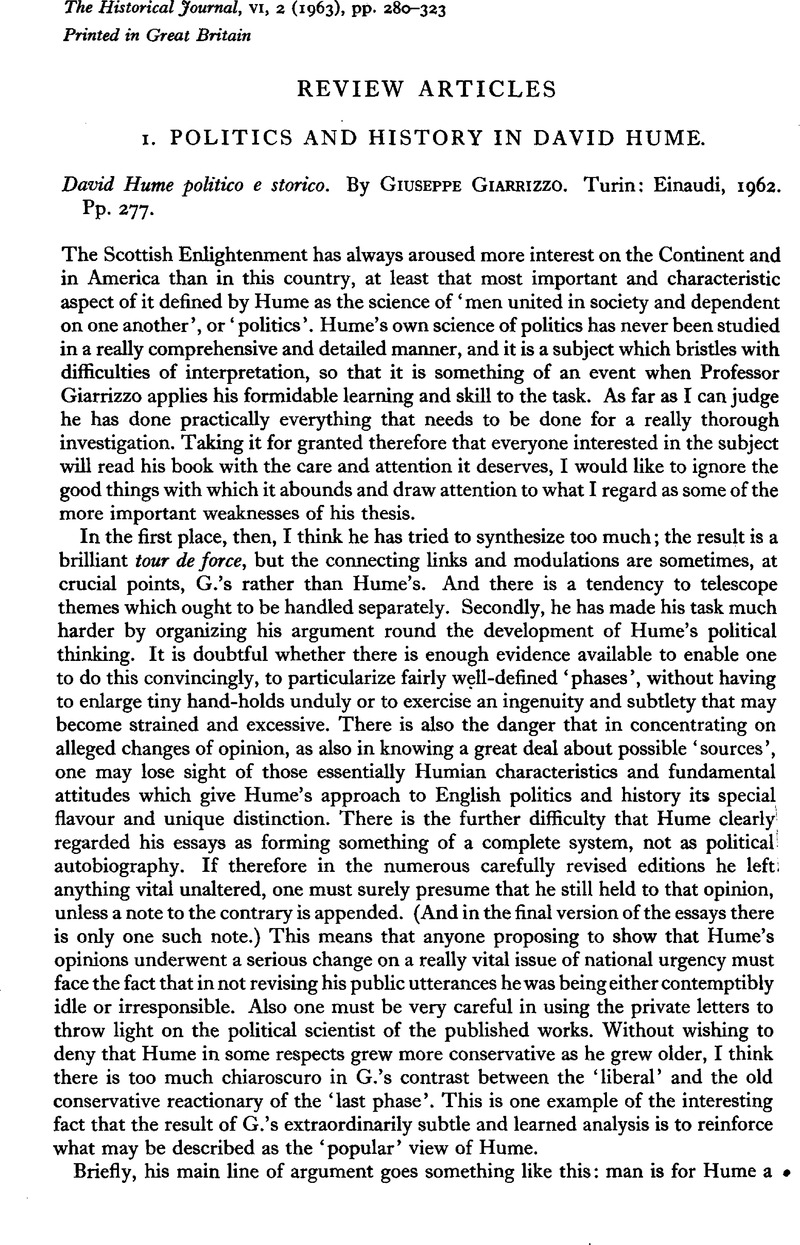Published online by Cambridge University Press: 11 February 2009

1 Moray McLaren quotes the part of the letter to Gilbert Elliot in which this declaration occurs in his anthology of Scottish wisdom. Elliot had committed the unpardonable offence of calling Hume an Englishman. Most continental scholars follow suit, e.g. ‘sein englisches Vaterland’ (von Srbik)—this is all too common.
2 ‘Of Civil Liberty.’ But monarchical governments though they have approached nearer to popular ones in ‘gentleness and stability’ are ‘still inferior’. Our modern humanity and moderation have not yet been able to overcome entirely the disadvantages of that form of government.
3 ‘That politics may be reduced to a science’ (see last two paragraphs).
4 Final chapter of the History: since 1688 England has enjoyed ‘if not the best system of government, at least the most entire system of liberty, that was ever known amongst mankind’.
5 Liberty of the Press.
6 Independency of Parliament.
7 Cf. p. 83. Hume, says Giarrizzo, came to see that the system of dependence, ‘il solo freno che la Corona potesse porre a uno slittamento repubblicano’, was no longer sufficient. But what evidence is there that Hume ever regarded dependence as the only such check? The King had a military force and there was no militia in England before Pitt’s Bill, and none in Scotland in Hume’s lifetime. He also had a ‘large revenue’, which was why the power of the Crown was on the increase—as Hume argued in the essay ‘Whether the British Monarchy inclines more to Absolute Monarchy or to a Republic’.
8 The distinction here is not between monarchies and republics as Giarrizzo thinks (p. 84), but between free and absolute governments.
9 Giarrizzo does not point out that this applies to Europe as a whole (cf. p. 216).
10 La capacità di istituti impersonali di reggere le strutture d’un ordinamento politico si misura dalla loro adeguatezza ai fini di progresso della società, o non piuttosto dall ‘efficacia dell’abitudine e dal custom…? (p. 229).
11 Giarrizzo quotes the royalist arguments put forward in chapter II (eve of the Petition of Right) as an example ‘della priorità ideale dell’autorità sulla libertà, la conclusione conser-vatrice cui inclinera deciso il pensiero dell’ultimo Hume’ (p. 168). They are not Hume’s arguments, however, because Hume goes on to say that the obvious answer did not occur to anyone at that time, namely, temporary suspension of the law in times of emergency, so that the royalists had to make out a case for the prerogative of arbitrary imprisonment. But the concluding remark would be endorsed by the most liberal political thinkers, anarchists apart, namely, that where it is absolutely necessary, it is better for society to be deprived of liberty than to be without government. ‘Conservatism’ is irrelevant in such a context. As usual, Hume is seizing the opportunity to weigh the pros and cons of a tricky question of politics.
12 For another example of G.’s confusion of matters that ought to be kept apart see the bottom of p. 81. The ‘jealousy’ of the magistrate which is necessary in a mixed type of government, and the habit by virtue of which men come to accept any government as legitimate are not mutually exclusive. G.’s remarks are an example of ignoratio elenchi.
13 Cf. appendix III of the History: ‘many constitutions, and none more than the British, have been improved even by violent innovations’.
14 The context of this remark shows that by ‘liberty’ Hume in fact means here, immediately at least, not political liberty, but the rule of law, which means in turn that he is here saying that the latter, the immediate interests of the middle class notwithstanding, is precarious. (In his Essay on the History of Civil Society of 1767, Ferguson had emphasized the point that the rule of law in civilized states is by itself no guarantee of liberty, if the liberal spirit is lacking.) But if the rule of law is precarious, then political liberty must be still more so.
15 Two further dubious illustrations of Hume’s alleged retreat from a more to a less liberal position are seen on p. 99. And cf. p. 177, concerning an alleged change in Hume’s attitude to religious superstition. As against this read what Hume has to say about Laud. Charles I ‘did not foresee that the ecclesiastical power which he exalted, not admitting of any precise boundary, might in time become more dangerous to public peace, and no less fatal to royal prerogative, than the other’ (i.e. the ‘independent spirit of parliaments’). A more important and authentic
16 Cf. History, ch. LXVIII (‘State of Parties—1679). ‘In every mixed government, such as that of England, the bulk of the nation will always incline to preserve the entire frame of the constitution; but according to the various prejudices, interests and dispositions of men, some will ever attach themselves with more passion to the regal, others to the popular part of the government.’ Giarrizzo interprets this as meaning that the ‘bulk of the nation’ are politically neutral and disinterested as opposed to the factions (pp. 194–5). In fact Hume is repeating here what he says in the Essay on the parties of Great Britain about the natural divisions of principle involved in the very nature of the British constitution: ‘however the nation may fluctuate between them, the parties themselves will always subsist so long as we are governed by a limited monarchy’.
17 As Bentham, for one, realized. ‘When Hume in his History wished to calm the spirit of party, and to treat the assions like a chemist who analyzes poisons, the mob of readers rose against him; they did not like to see it proved that men were rather ignorant than wicked…’ {Theory of Legislation, ed. C. K. Ogden, 12).
18 Vlachos's Essai sur la politique de Hume, penetrating as it is, is much less comprehensive, and a different sort of study.